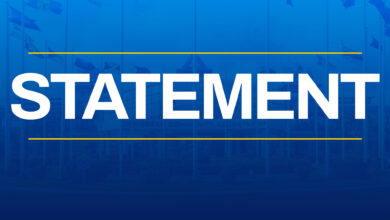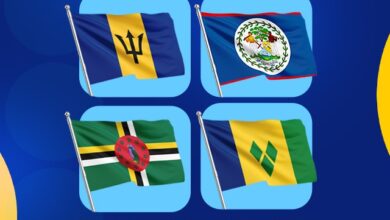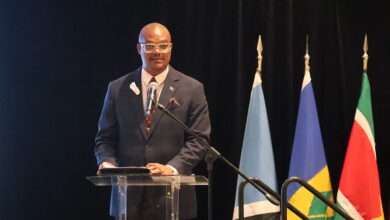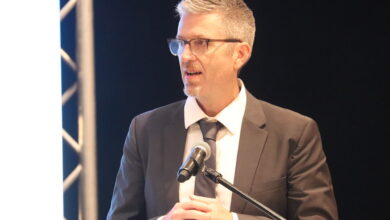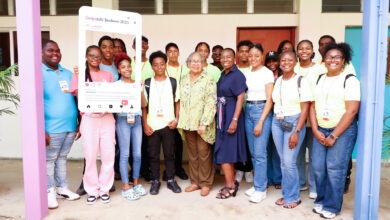SURINAME: Professor Gregory Rusland, Minister of Natural Resources,
The CARICOM Secretariat has to look for the major expertise within the region, and not try to re-invent the wheel, but try to make use of the expertise that exists in Suriname, in Trinidad and other areas of the region. Try also to make use of those structures in order to support the countries that are in lesser position than say the larger Caribbean countries where energy is concern.
“So, the Caribbean Community Secretariat should play more of a facilitating role in the area of energy as far as the structure is concerned and again the support to the smaller nations so that they also have the developments that they need.”
DOMINICA: Hon. Charles Savarin, Minister of Ports, Environment, Energy,
“The Secretariat needs to develop a technical capacity to provide technical support. This may be in terms of legal analyses of contracts, proposals, provision of existing laws, regulations and other items that arise.
“Communication, I think, is the key factor. I believe that all of participating member countries can be kept abreast and encouraged to make the inputs to keep the Secretariat informed and abreast of developments.
If I wanted to know what was the cost of electricity say for instance in any CARICOM Member State I should be able to send an email, pick up the telephone and call the Energy Unit and they should be able to tell me.
TRINIDAD AND TOBAGO: Hon. Conrad Enill, Minister of Energy & Energy Industries
I think what the Secretariat can do is to have a coordinating role to bring together the knowledge, experience and certainly the successes of these countries into some type of forum by which we could possibly determine a CARICOM policy, for what we are seeking to do is to deal with the agendas of small island states versus large countries.
For example, the method by which we are measuring carbon emissions. The larger countries are talking about it on a per capita basis and we are saying that that is not an appropriate measure for small island states because of the size of the populations and because the industrialization that is taking place will not necessarily be the same in the context of per capita. So we are entering that discussion on the basis of work that we are doing at the University of Trinidad and Tobago to provide the international community with an alternative to that measure. I think that’s how the CARICOM Secretariat can in fact assist; by bringing together the countries in the jurisdiction of similar objectives and speaking in the international community with one voice and certainly with one policy.
That would be an appropriate way for the Secretariat to assist in this particular regard.
German Technical Cooperation Agency/Caribbean Renewable Energy Development Programme (GTZ -CREDP)
Thomas Scheutzlich: Principal Adviser
Well the fact that the CARICOM Secretariat has re-established what many years ago was already there, an Energy Desk; is a major achievement. The Heads of Government recognize that the Energy problems in the Caribbean are really critical for the social and economic development in the Region. So, it is a major step forward to have an Energy Unit that looks into energy issues.
The task of the Energy Unit should be a facilitating role, networking, guiding the development of the sector at the regional level, e.g. facilitating a regional energy policy. There are funds flowing into the region from different donor organizations to assist the development of the energy sector.
There is a role for the Energy Unit as a “one-stop” agency that knows what is going on in the region, including overlapping and avoiding duplication. So if for example, GTZ starts a project in CARICOM with IDB or when World Bank comes in, the Energy Unit of the CARICOM Secretariat has a role to guide and to channel the funding to the right places so it can be wisely spent. So we see CARICOM Secretariat particularly the Energy Unit as an overarching role, facilitator for the energy sector.
SAINT LUCIA: Mr. Crispin D’Auvergne, Director Sustainable Development,
I think the Secretariat can do a number of things. First of all it can serve as a conduit for flow of resources for collective action in the Region. For example, there are projects that are too small to be considered, say, by a foreign investor in Saint Lucia, Dominica or Grenada. But perhaps there might be a possibility to bundle these projects at a sub-regional or regional level and take it from there.
I think it can serve as a locus as a focal point for technical support to be given. I will give you an example, there are times where Saint Lucia is approached by an investor who wants to setup some, say for example, a waste to energy facility but they come with a technology that is unfamiliar and they say well yes, you know this will work. But you are not so sure because there aren’t many examples or any examples that you can find anywhere else in the world. Now for you to make a wise choice on that, you need to have some technical expertise and knowledge which might not be easily accessible in-country.
So I think the energy desk at CARICOM could assist in procuring that kind of information. I think it can also play a critical role in popularizing the concept of Renewable Energy; what it is supposed to do and I don’t mean just for the general public but specific sectors.

